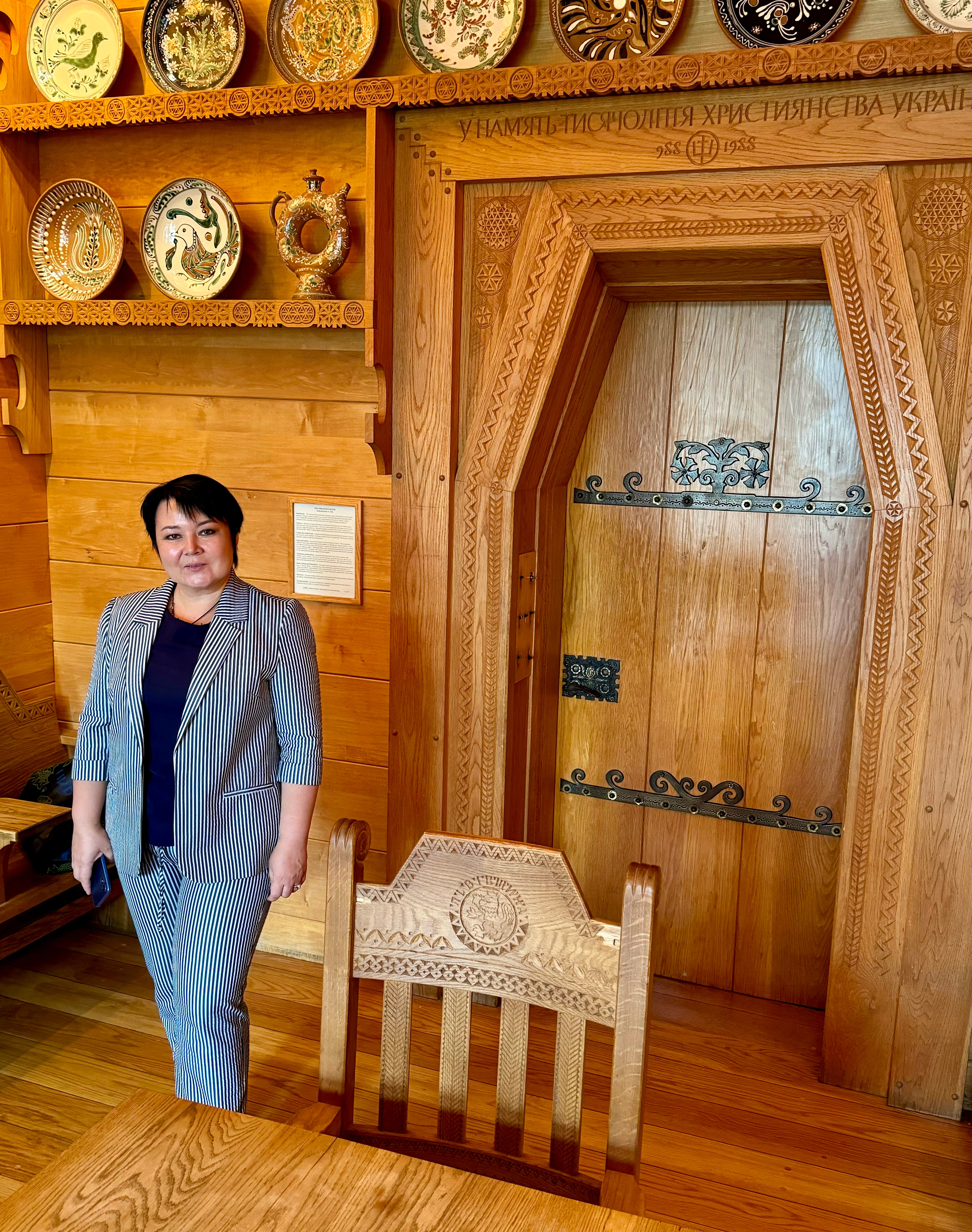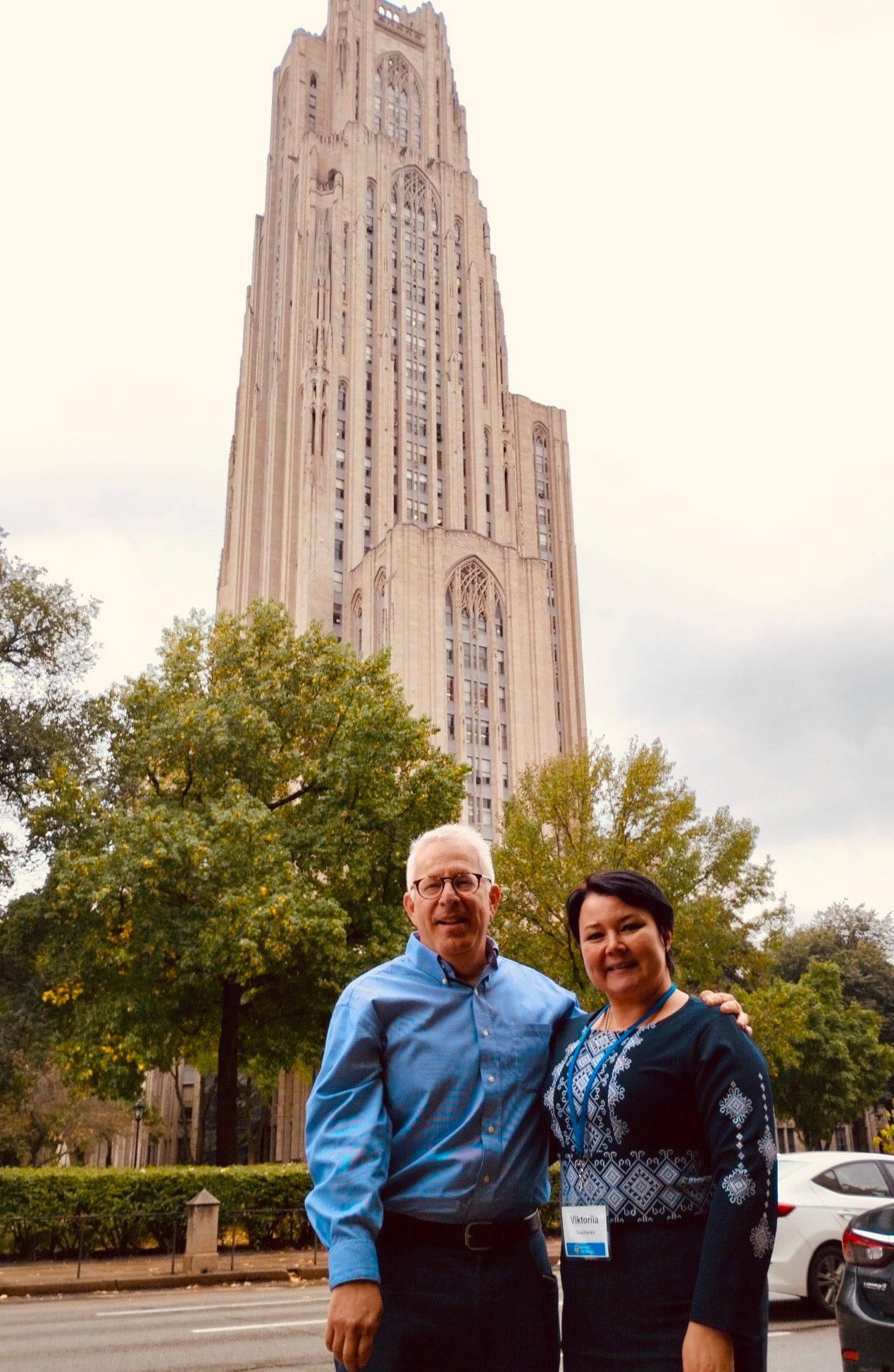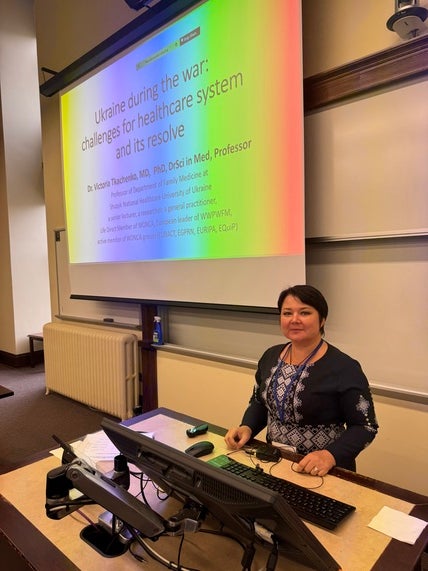
The University of Pittsburgh School of Medicine recently hosted Viktoriia Tkachenko, professor, researcher and primary care physician from Shupyk National Healthcare University of Ukraine in Kyiv, as part of the BridgeUSA Ukrainian Academic Fellows Program.
The program aims to establish connections between Ukrainian and U.S. scholars to foster long-term collaboration in areas such as joint research and pedagogy, course development, and publication.
Tkachenko’s research during her time in Pittsburgh centered on mental health in primary care medicine, which has become increasingly urgent since Russia’s invasion of Ukraine in February 2022. 
“Due to the war, Ukraine is experiencing mental health disorders among our population. People are chronically stressed and don’t know how to plan their lives. Some lost beloved people because of bombings, are displaced from their homes and had to move to other cities, and don’t know if they can come back,” she explained. “The Ministry of Health in Ukraine is forecasting that there will be an increase of the consequences of noncommunicable diseases like strokes and myocardial infarctions because of the additional stress factors of the war. People come to primary care doctors complaining of nonmental conditions such as pain, and when we try to resolve it, we are connecting it to mental health.”
Tkachenko’s faculty mentor was Bruce Rollman, who holds the UPMC Chair of General Internal Medicine and is director of the Center for Behavioral Health, Media and Technology, School of Medicine. Rollman took the lead in introducing Tkachenko to experts working at the School of Medicine and in the community. These included Ronald Poropatich, professor of medicine and director of the Center for Military Medicine Research, School of Medicine; and Gretchen Haas, associate professor of psychiatry, School of Medicine, and director of the Mental Illness Research, Education, and Clinical Center (MIRECC) Advanced Fellowship in Mental Health Research and Treatment at the VA Pittsburgh Healthcare System.
“People from different sciences have helped me to understand a multidisciplinary approach on how to better improve the mental health situation in Ukraine,” said Tkachenko.
One idea Tkachenko hopes to implement is building upon an existing World Health Organization mental health care training program in Ukraine--the Mental Health Gap Action Program--to involve obligatory, in-person instruction.
“We need more behavioral and cognitive-behavioral techniques, short protocols and interventions that we can provide in primary care to improve their moods, and then if the problem is deeper, redirect to a psychologist or psychiatrist.” 
She also appreciated the opportunity to see how differently medical training is structured in the United States. In Ukraine, she said, students have two years of training, including six months in university clinical settings.
Tkachenko had the opportunity to teach Pittsburgh-based physicians about her experiences as well.
“I asked her to put together a presentation for my Executive MBA in HealthCare class (through the Katz Graduate School of Business) about how the war in Ukraine impacted their health care system. Roughly half the people in that class are physicians. Everyone learned so much about how Ukraine has adapted to the challenge of being attacked,” said Rollman.
“Having these face-to-face contacts is so important and allows us to hear stories about what is going on in Ukraine and how we in the United States could be helpful,” Rollman said.
In addition, Tkachenko met with individuals in other areas of the University who are involved with work in Ukraine to discuss potential areas for cooperation, such as Jennifer Brick Murtazashvili, professor and founding director of the Center for Governance and Markets at the Graduate School for International Affairs.
The Swanson School of Engineering also hosted another Ukrainian researcher, Vitalii Ishchenko, through the program. Ishchenko’s faculty mentor was Götz Veser, professor of chemical engineering, School of Engineering.
After her experience here, one of Tkachenko’s goals is to find ways to continue collaborating with the professionals she met at the University to improve mental health care in Ukraine.
“I would like to continue to understand how [the] curriculum is organized here and what topics are provided for primary care doctors and social workers. In the future, I would like to organize a multidisciplinary team approach for mental health services in my country,” she said.
Rollman noted that there were numerous benefits to the School of Medicine participating in this program, including establishing lasting international ties.
“Viktoriia’s visit crystallized how much is going on here at the University. Through each contact, I discovered other people who were somehow involved with Ukraine. It’s been an honor to connect her to others at the University. It was also just a great privilege to show her around Pittsburgh,” he said.
“I am really grateful to the University of Pittsburgh and to the BridgeUSA Ukrainian Academic Fellows Program for providing me with this opportunity,” Tkachenko said.
